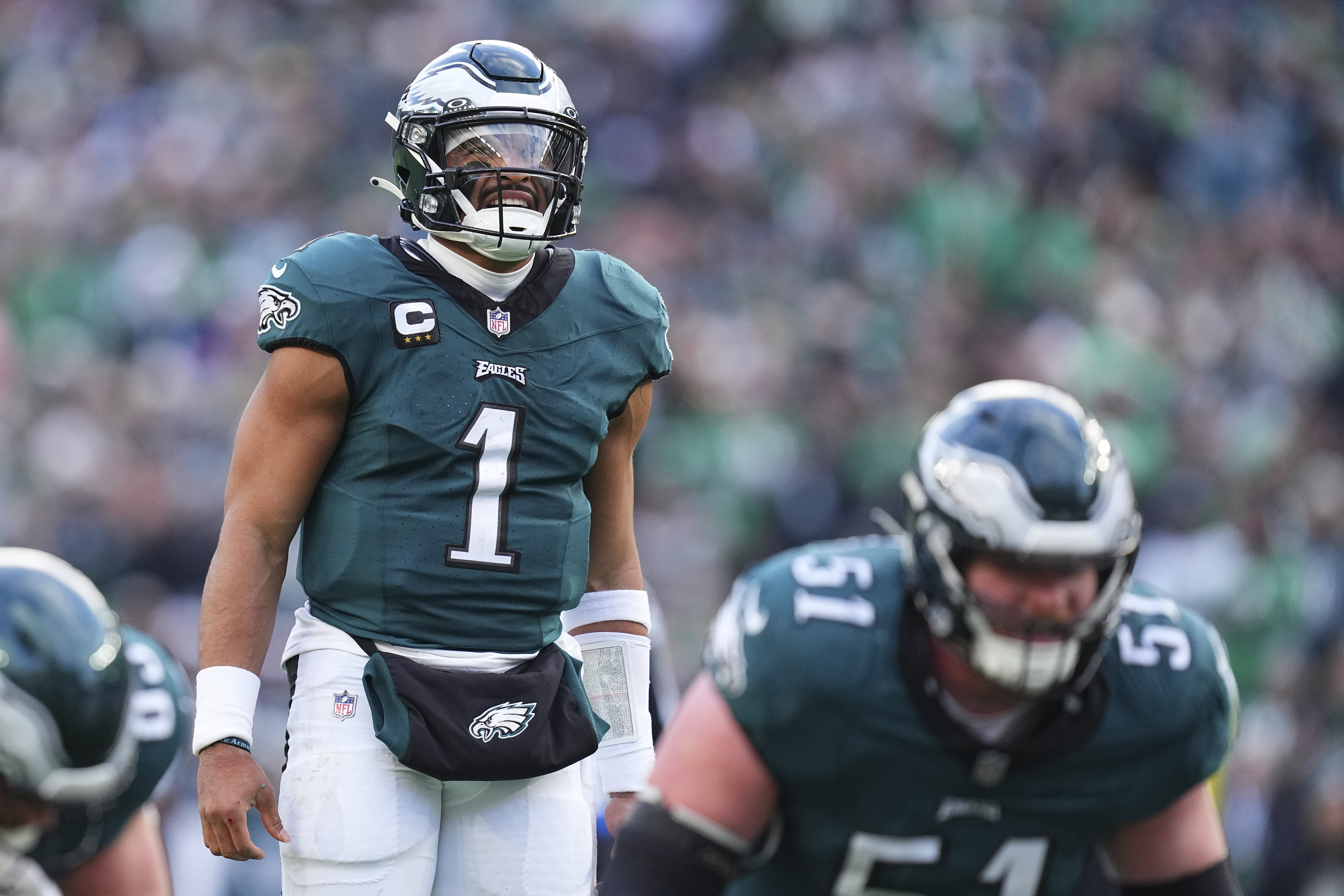The debate over who the Eagles should take with the 14th-overall pick in the 2017 NFL Draft is completely circumstantial. The selection will be based on any number of factors, from who's available, to need, and – to a certain degree – Howie Roseman's vision.
Even still, a running back in particular would be a somewhat controversial choice by the Eagles at No. 14. It would energize some fans while simultaneously flying in the face of beliefs held by others. Whether we're talking about Leonard Fournette, Dalvin Cook or Christian McCaffery, the position has been "devalued" in many minds. There's a line of thinking that backs aren't worth such an investment because a) their careers are generally shorter and b) the perception they are easily replaced.
Those aren't the only rationales against, either. A high percentage of the top backs in the league weren't first-round picks, like Le'Veon Bell, David Johnson, LeSean McCoy and Devonta Freeman, for example. This 2017 draft class is said to have "historic" potential, so the odds of finding a player like that in the second or third round are as good as they will ever be. With or without that knowledge, the argument could be made the Eagles have more pressing needs to address at 14.
Quite honestly, these are all valid points to a degree. The case has been made against taking running backs early for years, and people are conditioned to treat it as a rule.
In 2017, the Eagles might be able to make an exception.
This is not necessarily to say the Eagles should go running back in the first round. It's impossible to predict what options the front office will be presented with on draft day, let alone over the course of the next five weeks, so it's not black and white. That being said, it wouldn't hurt for the anti-running back crowd to keep an open mind, because there are a number of reasons that direction might make sense.
Philadelphia Eagles
Complete coverage of the Philadelphia Eagles and their NFL rivals from NBC Sports Philadelphia.
Maximize Carson Wentz
The Eagles just signed Alshon Jeffery and Torrey Smith, who – along with Jordan Matthews and Zach Ertz – have the potential to form one of the most dynamic collections of targets in the league. The club also retained Jason Peters and Lane Johnson, plus beefed up the interior of the offensive line, all of which should go a long way toward providing the best possible pass protection available.
Clearly, the goal of this offseason has been to build around Carson Wentz, except there is still one area of the offense the Eagles have yet to address. Nothing was done at running back in free agency, and while there are a number of explanations as to why that would be, it would be ridiculous to come this far and not go all the way.
Wentz has more than enough in terms of both weapons and supporting cast to take the next step in his second season at the helm for the Eagles. Even at running back, there's the venerable Darren Sproles, if you can rely on no one else. Yet, this franchise traded a lot of picks for the opportunity to go get Wentz, and is spending a lot of money to surround him with talent in 2017. Why would there be any less attention paid to who joins him in the backfield?
Can the Eagles get by without spending a first on a back? Sure. Maybe the club strikes gold on day two, and assuming not, a committee approach isn't uncommon around the NFL. Yet, if the goal is to get the absolute most out of Wentz, there's no reason to skimp when it comes to the guy taking handoffs. Put the best possible player there and watch how much better off a 24-year-old quarterback will be for it.
Need
The simple answer here is the Eagles need a running back. Best case scenario, Ryan Mathews is a free agent in 2018, anyway – who knows if he's healthy and on the roster come September – and Sproles talks as if retirement is a strong possibility. Wendell Smallwood showed promise as a rookie, but 83 total touches for a fifth-round pick isn't nearly enough to start making any long-term plans.
Is running back a greater need for the Eagles than cornerback? Defensive line? Even wide receiver? The answer is subjective, and ultimately irrelevant. If Roseman is on the clock at No. 14, the best player available is a running back and there are no trades on the table, then there really isn't any room for bias against a particular position.
If there's a tie, fine, take the cornerback. But whether it's the first round or the seventh, the Eagles have to prepare for the possibility they won't have any proven ball carriers on the roster come this time next year. At a certain point, it's kind of hard to complain about filling a glaring hole with a tremendous talent, even if it is at odds with your philosophy on team building.
The missing piece?
We don't want to fall into the trap of thinking every top running back prospect is Ezekiel Elliott, but it is hard to ignore how a dominant running back brought everything together for the Cowboys in 2016.
Elliott led the NFL in rushing as a rookie, finishing over 300 yards ahead of the runner-up, and the Cowboys wound up finishing as NFC East champions with a 13-3 record. Yes, a lot of the pieces were already in place before the back's arrival, including weapons in the passing game, a dominant run-blocking offensive line and an impressive, young quarterback. Elliott was the cherry on top.
The Cowboys weren't the only team to lean on their running back in '16. The Steelers rode Le'Veon Bell into the playoffs. The Patriots handed the football to LeGarrette Blount almost 300 times and led the league with 18 touchdowns on the ground. For all the talk of the NFL being a passing league where everybody has highly specialized, committee backfields, the feature back made something of a return last season.
In each case, the running back alone wasn't the reason for the success – Todd Gurley carried the ball a lot, too, but you didn't see the Rams in the playoffs. The Cowboys, Steelers and Patriots all have a quarterback, first and foremost, along with a decent supporting cast.
However, those situations are great examples of how a strong running back can complement a quarterback and an offense. When the game was on the line, it didn't always fall on Dak Prescott, Ben Roethlisberger or Tom Brady to make something happen. Oftentimes, they could hand it off.
Wentz is going to make a leap in his second season regardless. He's surrounded by weapons and has a deep offensive line in front of him. But if the Eagles intend to reach the next level as a team in 2017, the best thing they could do is bring somebody in who will reduce Wentz's workload and take some of the pressure off of the quarterback to do everything.



